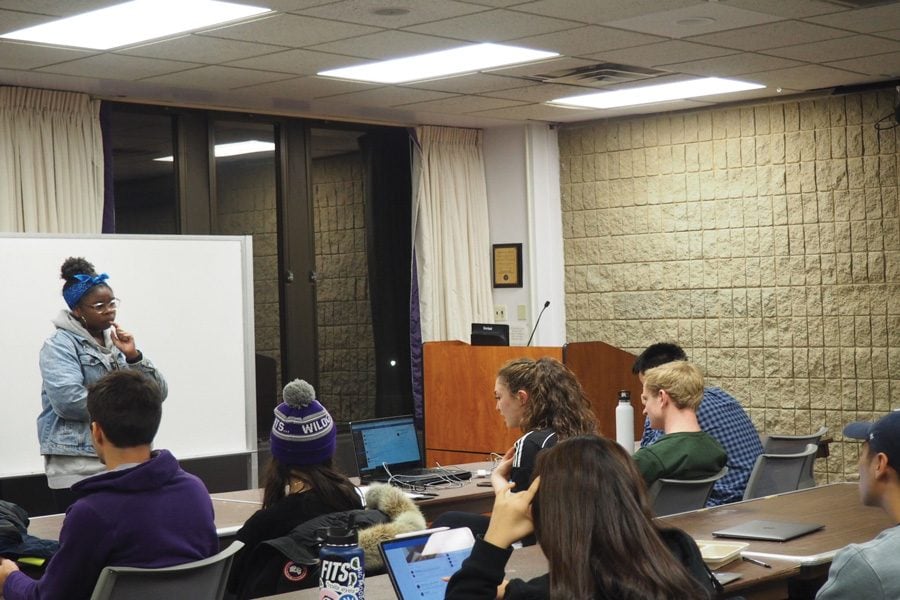ASG debates over University’s repainting of The Rock, argues lack of Native American representation in resolution
Yunkyo Kim/The Daily Northwestern
Soteria Reid presenting her resolution. Reid’s resolution passed in ASG Senate.
October 31, 2019
After a heated Wednesday debate about resolutions denouncing the University’s decision to paint over protest messages on The Rock, Associated Student Government passed one of two resolutions.
As of now, the painters of The Rock remain anonymous. The first legislation was written by Matthew Wylie, the speaker of the Senate and Weinberg sophomore. Soteria Reid, executive officer of justice and inclusion in ASG, wrote the second piece of legislation after a disagreement while collaborating with Wylie.
The SESP junior’s second resolution passed, and Reid said the writer and sponsors of the first resolution should have attempted to further incorporate the voices of the protesters and the Native American community at NU.
“There was a disagreement between me and the Speaker about the role that student narratives play in crafting legislation,” Reid said. “I very strongly believe there can be no legislation that comes before the Senate where ASG as the governmental body unilaterally makes the decision about what is the most important issue to students without first talking to them.”
The message on The Rock was first discovered during Homecoming Weekend. It criticized the University’s inaction to remove John Evans, the superintendent of Indian affairs and territorial governor of Colorado during the Sand Creek Massacre, from Northwestern’s Evanston campus. Evans is also the founder of Northwestern, and the city’s namesake.
Northwestern Facilities painted over the message on Oct. 28.
Furthermore, Wylie’s resolution argued that the University should issue a statement explaining its decision to repaint The Rock and affirm free speech on campus. Reid’s stated that the University should hold a public forum, release a statement, talk with student activists and ensure that protesters do not receive punitive action.
“It doesn’t mean that as a governmental body we don’t value freedom of speech,” Reid said. “We recognize that in order to make an effective change you have to reach out and make an informed piece of change.”
Wylie said Reid and his collaboration diverged when she decided to emphasize social justice and felt he did not act alone in writing the legislation. He said also attended the meeting Reid organized with the Native American Indigenous Student Alliance.
He was disappointed at the outcome, as he had originally advocated passing both legislations rather than one, but he respected the debate process, he said.
“I believe that the Senate inherently cannot make the wrong choice,” Wylie said. “It is their job to represent the student body and so whatever their decision is, I will abide by it and I firmly believe in institutions that are in place like ASG.”
Still, some Senate members said they felt that the debate left out a lot in the equation. Saul Osorio, an ASG senator, said he felt the emergency resolution was written and introduced with little time for senators to review, which led to a less-informed discussion. ASG also did not give freshmen senators information about how debates worked, Osorio.
“I thought people came into it uninformed, and that it just wasn’t being handled properly,” the SESP junior said.
Adam Davies, ASG’s executive vice president, also said Native American voices were missing from the debate, even though ASG has held a meeting with Native students following the painting of The Rock. In fact, ASG does not have a senator from NAISA, the SESP senior said.
Davies said Native American activists and many others want Northwestern students to know about John Evans’ actions even without a controversial event on campus.
“As students at Northwestern, especially those of us who aren’t indigenous have a responsibility to know who John Evans is because it’s a part of our history,” Davies said. “If the only time we talk about indigenous students at Northwestern is when controversy happens, then we’re not even doing the basic thing they asked us to do, which is to portray them in a positive light.”
Email: [email protected]
Twitter: @yunkyomoonk


